|
|
|
Sort Order |
|
|
|
Items / Page
|
|
|
|
|
|
|
| Srl | Item |
| 1 |
ID:
140729
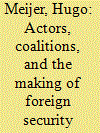

|
|
|
|
|
| Summary/Abstract |
In light of the intertwining logics of military competition and economic interdependence at play in Sino–American relations, this paper examines how the United States has balanced conflicting national security and economic interests in the making of US export control policy on defense-related technology toward China. Relying upon a large body of primary sources (including 170 interviews), it seeks to contribute to the understanding of this strategically sensitive yet neglected area of Sino–American relations. It is shown that, as a consequence of the erosion of the US capacity to control the diffusion of defense-related technology to China in the post-Cold War era, a growing set of actors within the United States has reassessed the security/economic calculus in Washington's relationship with Beijing. Specifically, this coalition advocates the streamlining of export controls to sustain the defense and technological industrial base and thereby maintain American military/technological preeminence vis-à-vis a rising China.
|
|
|
|
|
|
|
|
|
|
|
|
|
|
|
|
| 2 |
ID:
075386
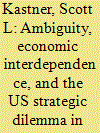

|
|
|
|
|
| Publication |
2006.
|
| Summary/Abstract |
As tensions across the Taiwan Strait have risen in recent years, some have argued that the US policy of strategic ambiguity-under which Washington leaves unclear if and how it would intervene in a cross-Strait conflict-has outlived its usefulness because ambiguity may foster dangerous misperceptions about US intentions and hence contribute to future crises. In this essay I critically examine strategic ambiguity, and conclude that ambiguity remains the best policy available to Washington given current US goals in the Taiwan Strait. I argue that ambiguity remains essential both to deterring a Chinese attack and to restraining Taiwanese moves toward independence, but that it nonetheless carries with it inherent risks of conflict. I further argue, however, that these additional risks triggered by ambiguity per se are likely small, and hence are overshadowed by the strategic obstacles faced by the alternatives to an ambiguous policy. Moreover, I show that growing economic interdependence between Mainland China and Taiwan further reduces the risk that ambiguity itself would be a contributing factor to war in the Taiwan Strait. As such, the relative attractiveness of ambiguity has likely increased, rather than decreased as argued by its critics, over the past decade.
|
|
|
|
|
|
|
|
|
|
|
|
|
|
|
|
| 3 |
ID:
180195
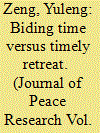

|
|
|
|
|
| Summary/Abstract |
Trade-conflict studies focus on whether and how economic interdependence suppresses interstate conflict initiation. Meanwhile, formal theories of war show that conflict initiation is inherently tied to its termination. In this article, I seek to bridge the two literature by utilizing a war of attrition model to formalize the relationship between economic dependence and conflict duration. I theorize that the strategic calculation ultimately comes down to a trade-off between biding one’s time and retreating in a timely manner. In the context of economic attrition, states weigh the relative costs of suffering an additional round of economic disruption against the potential benefits of winning the disputed good. As such, economic dependence can have both coercive and informational effects and these effects are contingent upon issue salience. When the issue salience is low, the coercive effect dominates; states are more likely to quit conflicts as they suffer proportionally larger economic costs. When the issue salience is high enough, the informational effect can kick in; states are less likely to quit conflicts with increasing economic costs. I test these implications on the International Crisis Behavior (ICB) and the Militarized Interstate Dispute (MID) data, finding strong support for the informational effect and suggestive evidence for the coercive one.
|
|
|
|
|
|
|
|
|
|
|
|
|
|
|
|
| 4 |
ID:
112808
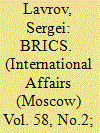

|
|
|
|
|
| Publication |
2012.
|
| Summary/Abstract |
THE ESTABLISHMENT OF BRICS initiated by the President of the Russian Federation Vladimir Putin in 2006 has been one of the most significant geopolitical events since the beginning of the new century. The group has shortly become a powerful factor influencing world politics and economy.
|
|
|
|
|
|
|
|
|
|
|
|
|
|
|
|
| 5 |
ID:
113973
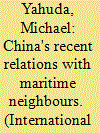

|
|
|
|
|
| Publication |
2012.
|
| Summary/Abstract |
Chinese maritime assertiveness since 2008 is a product of China's growing economic and military power combined with a centrally fostered nationalism. Although incidents with several maritime neighbours may not have all been initiated by China, the Chinese over-reacted. Matters were made worse by the opacity of Chinese decision-making processes and by problems of governance as shown by the multiplicity of Chinese authorities in charge of separate naval forces. The American 'pivot' to Asia provides neighbours with a hedge against an overbearing China, but they still need to cultivate relations with China on whom they are economically dependent.
|
|
|
|
|
|
|
|
|
|
|
|
|
|
|
|
| 6 |
ID:
192034
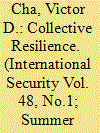

|
|
|
|
|
| Summary/Abstract |
Since the 2010s, China has used economic coercion against Western and Asian states to achieve territorial and political goals. China's leveraging of its market is a form of “predatory liberalism” that weaponizes the networks of interdependence created by globalization. The United States and other like-minded partners have mostly used piecemeal “de-risking” measures such as decoupling, supply chain resilience, reshoring, and trade diversion to reduce dependence on China and thereby minimize vulnerability to its economic coercion. But these practices do not stop the Chinese government's economic bullying. “Collective resilience” is a peer competition strategy designed to deter the Xi Jinping regime's economic predation. What informs this strategy is the understanding that interdependence, even asymmetric interdependence, is a two-way street. Original trade data show that the previous and current targets of economic coercion by the Xi Jinping regime export over $46.6 billion worth of goods to China on which it is more than 70 percent dependent as a proportion of its total imports of those goods. These target states could band together in a collective resilience alliance and practice economic deterrence by promising to retaliate against China's high-dependence trade should Beijing act against any one of the alliance members.
|
|
|
|
|
|
|
|
|
|
|
|
|
|
|
|
| 7 |
ID:
146902
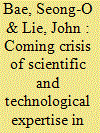

|
|
|
|
|
| Summary/Abstract |
South Korea has shifted from a relatively well-educated but poorly remunerated workforce to a highly skilled and compensated one in high-value-added industries. This paper analyzes the South Korean government’s science and technology policy and the supply of scientists and engineers in emerging industries. We note a potential shortfall of skilled talent in the near future.
|
|
|
|
|
|
|
|
|
|
|
|
|
|
|
|
| 8 |
ID:
132321
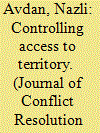

|
|
|
|
|
| Publication |
2014.
|
| Summary/Abstract |
Previous scholarship has largely failed to address the effect of economic interdependence on issue areas other than interstate conflict. This study seeks to redress this lacuna by focusing on states' visa policies and examining the impact of trade and capital interdependence in the context of transnational terrorism. The article argues that economic ties affect visa policies through a reconfiguration of preferences and the opportunity costs of economic loss and by tempering the impact of terrorism. To support this claim, the study conducts statistical analysis using directed dyad data on the visa policies of 207 states and independent political units. The article shows that the impact of economic interdependence is contingent on whether states are directly targeted in attacks of terrorism or face indirect threats from global terror. The study finds that economic incentives overwhelm security concerns when threats are indirect but have relatively limited influence, given threats against a state's own citizens or territory.
|
|
|
|
|
|
|
|
|
|
|
|
|
|
|
|
| 9 |
ID:
100387
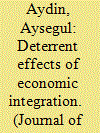

|
|
|
|
|
| Publication |
2010.
|
| Summary/Abstract |
Economic interdependence and international conflict studies have traditionally focused on the role of bilateral trade on direct deterrence, mostly omitting its indirect effects on third-party states. While scholars in the extended deterrence literature have examined the role of defender-target trade in deterring aggressors, most empirical research has remained limited to immediate deterrence and neglected general deterrence. This article synthesizes these literatures and goes beyond the dyad-level analysis in trade-conflict studies by focusing on the deterrent effects of trade. I claim that trade ties between the defender and target are not sufficient for extended general deterrence. This is mainly because international trade by itself is a poor indicator of the extent to which the target is an economically important friend of the defender, worth defending against aggressors. Empirical analysis of militarized disputes between rival states in the post-1945 period supports this point and shows that extended deterrence success is most likely in cases where the defender and target are economically integrated through regional trade institutions as well as conducting heavy trade. Economically minded defenders can successfully generate credible signals of resolve if they have institutional ties with their important trade partners.
|
|
|
|
|
|
|
|
|
|
|
|
|
|
|
|
| 10 |
ID:
129992
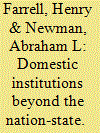

|
|
|
|
|
| Publication |
2014.
|
| Summary/Abstract |
What is the relationship between domestic and international politics in a world of economic interdependence? This article discusses and organizes an emerging body of scholarship, which the authors label the new interdependence approach, addressing how transnational interactions shape domestic institutions and global politics in a world of economic interdependence. This literature makes three important contributions. First, it examines how domestic institutions affect the ability of political actors to construct the rules and norms governing interdependent relations and thus present a source of asymmetric power. Second, it explores how interdependence alters domestic political institutions through processes of diffusion, transgovernmental coordination, and extraterritorial application and in turn how it changes the national institutions mediating internal debates on globalization. Third, it studies the shifting boundaries of political contestation through which substate actors affect decision making in foreign jurisdictions. Given the importance of institutional change to the new interdependence agenda, the authors suggest several instances where historical institutionalist tools might be exploited to address these transnational dynamics, in particular, mechanisms of cross-national sequencing and change strategies of substate actors. As globalization continues, it will be ever more difficult to examine national trajectories of institutional change in isolation from each other. Equally, it will be difficult to understand international institutions without paying attention to the ways in which they both transform and are transformed by domestic institutional politics. While the new interdependence approach does not yet cohere as a single voice, the authors believe that it offers an innovative agenda that holds tremendous promise for both comparative and international relations research as it calls on scholars to reconsider the dynamic nature of globalization for global politics.
|
|
|
|
|
|
|
|
|
|
|
|
|
|
|
|
| 11 |
ID:
174078
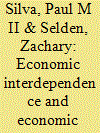

|
|
|
|
|
| Summary/Abstract |
Economic sanctions impose costs on sender as well as target states, and those costs increase with the degree of interdependence between the states in question. We test the hypothesis that EU member states that are more economically interdependent with Russia would be the most opposed to the imposition of sanctions on Russia in response to its actions in Ukraine in 2013–2014. However, an analysis of the debate over the imposition of sanctions shows the opposite: a modest positive correlation between economic interdependence and support for the sanctions among EU member states. This finding further calls into question the fundamental linkage between economic self-interest and conflict avoidance among interdependent states.
|
|
|
|
|
|
|
|
|
|
|
|
|
|
|
|
| 12 |
ID:
162647
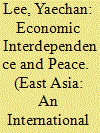

|
|
|
|
|
| Summary/Abstract |
Liberalists have argued that increased economic interdependence will deter the likelihood of war as opportunity costs of a military conflict will not be fashionable for either side. Realists such as Waltz contended that while interdependence promotes peace to a certain extent, it also multiplies the occasions for conflicts. Dale Copeland drew perspectives from both sides to argue that interdependence may lead to peace depending on the expectations of the future trade environment. Now, with the United States’ (US) ongoing trade war with China and its legacy of trade conflicts with Japan in the 1990s, the question of whether economic interdependence brings peace deserves to be revisited. This article, through making a comparison between the cases of bilateral trade conflicts between the US and China and the US and Japan, contends that increased bilateral economic interdependence also increased the frequency of conflicts in the two respective cases. Moreover, it further argues that such increase in frequency was due to the US’s negative expectations on the future trade environment.
|
|
|
|
|
|
|
|
|
|
|
|
|
|
|
|
| 13 |
ID:
077671
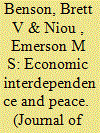

|
|
|
|
|
| Publication |
2007.
|
| Summary/Abstract |
Most of the contemporary policy debate regarding economic interdependence and peace has focused on devising responses either in favor of or in opposition to the prevailing notion that trade is positively and unconditionally correlated with peace. The China and Taiwan case-noteworthy for the simultaneous presence of an ever-increasing economic interdependence and an adversarial political relationship-provides an interesting counter-example to the leading positions in the literature. What is missing in the literature is a model that studies states' decisions to trade and initiate conflict as a function not only of their own utility but also of their perceptions about how their opponent will respond. States' decisions to trade depend on the likelihood that their prospective trade partner will initiate a conflict, and decisions to initiate a conflict depend on perceptions of the likelihood that the target will concede. In this article, the authors develop a model that expands the domain of the trade-peace analysis by endogenizing and analyzing states' decisions to trade and initiate conflicts
|
|
|
|
|
|
|
|
|
|
|
|
|
|
|
|
| 14 |
ID:
193586
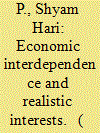

|
|
|
|
|
| Summary/Abstract |
The perception of conflicts between explicit political actors such as nation-states has an interesting peculiarity over its manifestation. When visible violent outbursts of conflict are absent, the international community often becomes optimistic and tends to envision a world matured from past failures (read conflict). This image is not formed by discounting the elements of latent conflict but is often built on the conviction that economic interdependence is infallible. The interdependence is understood to be such that, in a globalized world, often the perils—spillover effect of wars and the imposition of sanctions—deter conflict actors from engaging in one, and if engaged, not prolonging it. However, time and again, the repulsion between potential carnage and sanctions seems least effective. The international community is often taken off-guard by conflictual events that make them ponder if economic interdependence promoted through globalization is a true factor in preventing wars.
|
|
|
|
|
|
|
|
|
|
|
|
|
|
|
|
| 15 |
ID:
184103
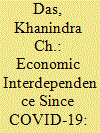

|
|
|
|
|
| Summary/Abstract |
In the backdrop of COVID-19-induced geo-political backlash against China, the article makes an assessment of the nature of economic interdependence of South Asian nations with China. Though COVID-19-induced lockdown led to a decline in trade with China, it recovered quickly in subsequent months. In the case of India, even after imposing restrictive measures, trade with China was found to bounce back indicating to a greater dependence on China. Further, asymmetry in economic engagement with China could be observed for several of the South Asian nations. Chinese investment in the region remained muted during the pandemic. However, strategic involvement in South Asia by China, and other powers, increased considerably which has been manifested by her provisioning of economic incentives and COVID-19-related aid. In the light of increasing strategic influence, South Asian countries desirous of benefitting from foreign trade and investment in their respective economies will need to encourage free and fair competition rather than towing geo-political lines so that sustainable economic gains can be made, which will require strengthening of various market supporting institutions in the respective economies. India’s economic strategy will also assume significance in boosting confidence and increasing the level of integration within South Asia.
|
|
|
|
|
|
|
|
|
|
|
|
|
|
|
|
| 16 |
ID:
147748
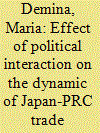

|
|
|
|
|
| Summary/Abstract |
A brief review of the results from studies by a number of Asian specialists on questions of the mutual influence of political and economic aspects of Sino-Japanese relations in the second half of the 20th century. Econometric methods are used to reveal the interconnection between political events and trends in the development of present-day Sino-Japanese trade relations.
|
|
|
|
|
|
|
|
|
|
|
|
|
|
|
|
| 17 |
ID:
075422
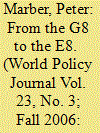

|
|
|
| 18 |
ID:
097730
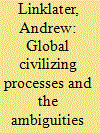

|
|
|
|
|
| Publication |
2010.
|
| Summary/Abstract |
Increased social power over the millennia has led to remarkable achievements in varied spheres of endeavour while introducing new possibilities for more destructive forms of harm over greater distances. Efforts to create moral frameworks to protect persons from senseless harm have been critical replies to the ambiguities of human interconnectedness. Over the millennia, societies have become entangled in global 'civilizing processes' such as the systems of communication that now encompass humanity as a whole, enabling different peoples to become better attuned to each other. Societies of states have immense significance for that long-term development. They have been arenas in which independent communities have discovered the prospects for, as well as the constraints on, agreements on norms that can be anchored in the most readily available points of solidarity between strangers - those vulnerabilities to mental and physical suffering that are shared by human beings everywhere. The recovery of 'universal history from a cosmopolitan point of view' can examine the contribution that international societies have made to global civilizing processes that harness such solidarities to restrain the human capacity to cause violent and non-violent harm to distant peoples. It can support the normative project of promoting global civilizing processes that employ unprecedented levels of collective power to reduce the tragic effects of the ambiguities that have accompanied long-term trends towards higher levels of human interconnectedness.
|
|
|
|
|
|
|
|
|
|
|
|
|
|
|
|
| 19 |
ID:
093822
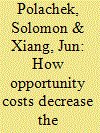

|
|
|
|
|
| Publication |
2010.
|
| Summary/Abstract |
This article shows that the opportunity costs resulting from economic interdependence decrease the probability of war in an incomplete information game. This result is strongly consistent with existing empirical analyses of the inverse trade-conflict relationship but is the opposite of the conclusion reached by Gartzke, Li, and Boehmer, who reject the opportunity cost argument in a game-theoretic framework. As a result of our findings, one cannot dismiss the opportunity cost argument as the explanation why trading nations fight less. Instead our study reaffirms the central position of opportunity costs as the basis for the inverse trade-conflict relationship, thus implying that one need not rely on signaling.
|
|
|
|
|
|
|
|
|
|
|
|
|
|
|
|
| 20 |
ID:
156582
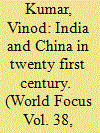

|
|
|
|
|
| Summary/Abstract |
In this era of globalisation each nation depends upon others in terms of economic as well as security cooperation. No state can leave in isolations. India and China are the major emerging economic power with a large chunk of human resource and a huge market in Asia.
|
|
|
|
|
|
|
|
|
|
|
|
|
|
|
|
|
|
|
|
|